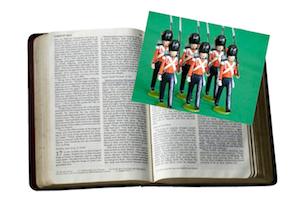 Yesterday I mentioned that I’ve been reading the Better Bibles Blog, including a couple of posts by Iver Larsen on numbers in the Bible. His second post discussed “inclusive counting,” which we can especially see in the way the Bible expresses the concept of days and their corresponding nights.
Yesterday I mentioned that I’ve been reading the Better Bibles Blog, including a couple of posts by Iver Larsen on numbers in the Bible. His second post discussed “inclusive counting,” which we can especially see in the way the Bible expresses the concept of days and their corresponding nights.
Doing a quick search in Accordance for all verses that contain both the words “days” and “nights,” I found fifteen verses that had both those words in them. Conveniently enough, every one of those fifteen verses contained a parallel statement of x days and x nights. Here they are:
Genesis 7:4 Seven days from now I will send rain on the earth for forty days and forty nights, and I will wipe from the face of the earth every living creature I have made.”
Genesis 7:12 And rain fell on the earth forty days and forty nights.
Exodus 24:18 Then Moses entered the cloud as he went on up the mountain. And he stayed on the mountain forty days and forty nights.
Exodus 34:28 Moses was there with the LORD forty days and forty nights without eating bread or drinking water. And he wrote on the tablets the words of the covenant—the Ten Commandments.
Deuteronomy 9:9 When I went up on the mountain to receive the tablets of stone, the tablets of the covenant that the LORD had made with you, I stayed on the mountain forty days and forty nights; I ate no bread and drank no water.
Deuteronomy 9:11 At the end of the forty days and forty nights, the LORD gave me the two stone tablets, the tablets of the covenant.
Deuteronomy 9:18 Then once again I fell prostrate before the LORD for forty days and forty nights; I ate no bread and drank no water, because of all the sin you had committed, doing what was evil in the LORD’S sight and so provoking him to anger.
Deuteronomy 9:25 I lay prostrate before the LORD those forty days and forty nights because the LORD had said he would destroy you.
Deuteronomy 10:10 Now I had stayed on the mountain forty days and nights, as I did the first time, and the LORD listened to me at this time also. It was not his will to destroy you.
1Samuel 30:12 part of a cake of pressed figs and two cakes of raisins. He ate and was revived, for he had not eaten any food or drunk any water for three days and three nights.
1Kings 19:8 So he got up and ate and drank. Strengthened by that food, he traveled forty days and forty nights until he reached Horeb, the mountain of God.
Job 2:13 Then they sat on the ground with him for seven days and seven nights. No one said a word to him, because they saw how great his suffering was.
Jonah 1:17 But the LORD provided a great fish to swallow Jonah, and Jonah was inside the fish three days and three nights.
Matthew 4:2 After fasting forty days and forty nights, he was hungry.
Matthew 12:40 For as Jonah was three days and three nights in the belly of a huge fish, so the Son of Man will be three days and three nights in the heart of the earth.
Now, admittedly, it’s not impossible that in every one of those cases, the exact same number of days and nights occurred. However, it seems much more likely to recognize that this is a Hebraic expression, probably stemming from their love of parallelism. That is, they always write the same number of days as nights. It just sounds nicer to the ear than “seven days and six nights.”
That’s troublesome to the modern Western mind, because we want precision in numbering things. However, the Bible wasn’t written by a twenty-first century Westerner, nor are we the primary audience. At times we have to place ourselves in their situation and try to understand things as they would.
People have devised elaborate explanations as to how Jesus was actually in the tomb for 3 days and 3 nights. It seems better to understand that he was in the tomb for parts of 3 days as well as the nights between those days. The Hebrew way of saying this was “3 days and 3 nights.”
This explanation makes sense to me, helping me understand what Jesus said in Matthew 12:40.
Like this:
Like Loading...
 As the book of Exodus begins, the Israelites are in Egypt and quickly become slaves there. As I mentioned yesterday, it’s only logical to suppose that their oppressors disarmed them.
As the book of Exodus begins, the Israelites are in Egypt and quickly become slaves there. As I mentioned yesterday, it’s only logical to suppose that their oppressors disarmed them.
 Yesterday I mentioned that I’ve been reading the
Yesterday I mentioned that I’ve been reading the